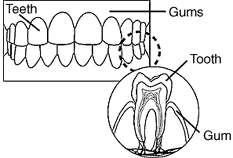What should I do each day to stay healthy with diabetes?
 | Follow the healthy eating plan that you and your doctor or dietitian have worked out. Eat your meals and snacks at around the same times each day. |
 | Be active a total of 30 minutes most days. Ask your doctor what activities are best for you. |
 | Take your diabetes medicine at the same times each day. |
 | Check your blood glucose every day. Each time you check your blood glucose, write the number in your record book. Call your doctor if your numbers are too high or too low for 2 to 3 days. |
 | Check your feet every day for cuts, blisters, sores, swelling, redness or sore toenails. |
 | Brush and floss your teeth and gums every day. |
 | Don't smoke. |
How can diabetes hurt my teeth and gums?
Back to Top Tooth and gum problems can happen to anyone. A sticky film full of germs (also called plaque [PLAK]) builds up on your teeth. High blood glucose helps germs (bacteria) grow. Then you can get red, sore and swollen gums that bleed when you brush your teeth. People with diabetes can have tooth and gum problems more often if their blood glucose stays high. High blood glucose can make tooth and gum problems worse. You can even lose your teeth.
Smoking makes it more likely for you to get a bad case of gum disease, especially if you have diabetes and are age 45 or older.
Red, sore and bleeding gums are the first sign of gum disease. This can lead to periodontitis (PER-ee-oh-don-TY-tis). Periodontitis is an infection in the gums and the bone that holds the teeth in place. If the infection gets worse, your gums may pull away from your teeth, making your teeth look long.
Call your dentist if you think you have problems with your teeth or gums.
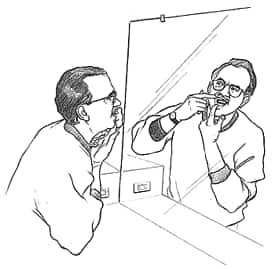 |
Check your teeth and gums for signs of problems from diabetes.
|
How do I know if I have damage to my teeth and gums?
If you have one or more of these problems, you may have tooth and gum damage from diabetes:
- Red, sore, swollen gums
- Bleeding gums
- Gums pulling away from your teeth so your teeth look long
- Loose or sensitive teeth
- Bad breath
- A bite that feels different
- Dentures (false teeth) that do not fit well
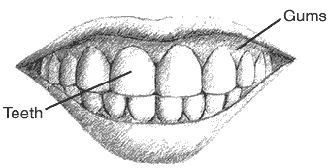
How can I keep my teeth and gums healthy?
- Keep your blood glucose as close to normal as possible
- Use dental floss at least once a day. Flossing helps prevent the buildup of plaque on your teeth. Plaque can harden and grow under your gums and cause problems. Using a sawing motion, gently bring the floss between the teeth, scraping from bottom to top several times
- Brush your teeth after each meal and snack. Use a soft toothbrush. Turn the bristles against the gum line and brush gently. Use small, circular motions. Brush the front, back, and top of each tooth
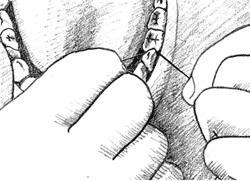
Brush and floss your teeth and gums every day.
- If you wear false teeth, keep them clean
- Ask the person who cleans your teeth to show you the best way to brush and floss your teeth and gums. Ask this person about the best toothbrush and toothpaste to use
- Call your dentist right away if you have problems with your teeth and gums
- Call your dentist if you have red, sore, or bleeding gums; gums that are pulling away from your teeth; a sore tooth that could be infected; or soreness from your dentures
- Get your teeth and gums cleaned and checked by your dentist twice a year
- If your dentist tells you about a problem, take care of it right away
- Be sure your dentist knows that you have diabetes
- If you smoke, talk to your doctor about ways to quit smoking
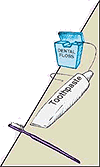
How can my dentist take care of my teeth and gums?
- By cleaning and checking your teeth and gums twice a year
- By helping you learn the best way to brush and floss your teeth and gums
- By telling you if you have problems with your teeth or gums and what to do about them
- By making sure your false teeth fit well
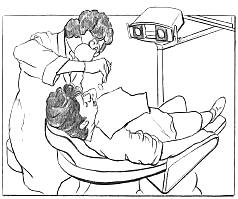 |
Get your teeth cleaned and checked twice a year.
|
Plan ahead. You may be taking a diabetes medicine that can make your blood glucose too low. This very low blood glucose is called hypoglycemia (hy-po-gly-SEE-mee-uh). If so, talk to your doctor and dentist before the visit about the best way to take care of your blood glucose during the dental work. You may need to bring some diabetes medicine and food with you to the dentist's office.
If your mouth is sore after the dental work, you might not be able to eat or chew for several hours or days. For guidance on how to adjust your normal routine while your mouth is healing, ask your doctor:
- What foods and drinks you should have
- How you should change your diabetes medicines
- How often you should check your blood glucose
For more information Diabetes Teachers (nurses, dietitians, pharmacists, and other health professionals)
To find a diabetes teacher near you, call the American Association of Diabetes Educators toll-free at 1-800-TEAMUP4 (1-800-832-6874), or look on the Internet at www.diabeteseducator.org and click on "Find an Educator."
Recognized Diabetes Education Programs (teaching programs approved by the American Diabetes Association)
To find a program near you, call toll-free at 1-800-DIABETES (1-800-342-2383), or see www.diabetes.org on the Internet.
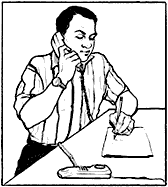
Dietitians
To find a dietitian near you, call the American Dietetic Association's National Center for Nutrition and Dietetics toll-free at 1-800-366-1655, or look on the Internet at www.eatright.org and click on "Find a Dietitian."
Government
The National Institute of Dental and Craniofacial Research (NIDCR) is part of the National Institutes of Health. To learn more about tooth and gum problems, write or call NIDCR's information clearinghouse, the National Oral Health Information Clearinghouse (NOHIC), at 1 NOHIC Way, Bethesda, MD 20892-3500, (301) 402-7364; or see www.nidcr.nih.gov on the Internet.
More in the Series
The "Prevent Diabetes Problems" series includes seven booklets that can help you learn more about how to prevent diabetes problems.
- Keep Your Diabetes Under Control
- Keep Your Eyes Healthy
- Keep Your Feet and Skin Healthy
- Keep Your Heart and Blood Vessels Healthy
- Keep Your Kidneys Healthy
- Keep Your Nervous System Healthy
- Keep Your Teeth and Gums Healthy
For free single printed copies of these booklets, call, write, fax, or e-mail:
National Diabetes Information Clearinghouse
1 Information Way
Bethesda, MD 20892-3560
Phone: 1-800-860-8747 or (301) 654-3327
Fax: (301) 907-8906
Email: ndic@info.niddk.nih.gov
Acknowledgments The National Diabetes Information Clearinghouse thanks the people who helped review or field-test this booklet.
American Association of Diabetes American Diabetes Association Diabetes Research and Training Center | Diabetes Research and Training Center Diabetes Research and Training Center Grady Health System Marc Shlossman, D.D.S., M.S. | Health Care Financing Indian Health Service Indian Health Service Medlantic Research Center Texas Diabetes Council |
National Diabetes Information Clearinghouse
1 Information Way
Bethesda, MD 20892-3560
Email: ndic@info.niddk.nih.gov
The National Diabetes Information Clearinghouse (NDIC) is a service of the National Institute of Diabetes and Digestive and Kidney Diseases (NIDDK). The NIDDK is part of the National Institutes of Health under the U.S. Department of Health and Human Services. Established in 1978, the clearinghouse provides information about diabetes to people with diabetes and to their families, health care professionals, and the public. NDIC answers inquiries, develops and distributes publications, and works closely with professional and patient organizations and Government agencies to coordinate resources about diabetes.
Publications produced by the clearinghouse are carefully reviewed by both NIDDK scientists and outside experts.
This e-text is not copyrighted. The clearinghouse encourages users of this e-pub to duplicate and distribute as many copies as desired.
11/15/2010
This article is intended to promote understanding of and knowledge about general oral health topics. It is not intended to be a substitute for professional advice, diagnosis or treatment. Always seek the advice of your dentist or other qualified healthcare provider with any questions you may have regarding a medical condition or treatment.
ORAL HEALTH QUIZ
What's behind your smile?
Take our Oral Health assessment to get the most from your oral care routine
ORAL HEALTH QUIZ
What's behind your smile?
Take our Oral Health assessment to get the most from your oral care routine






